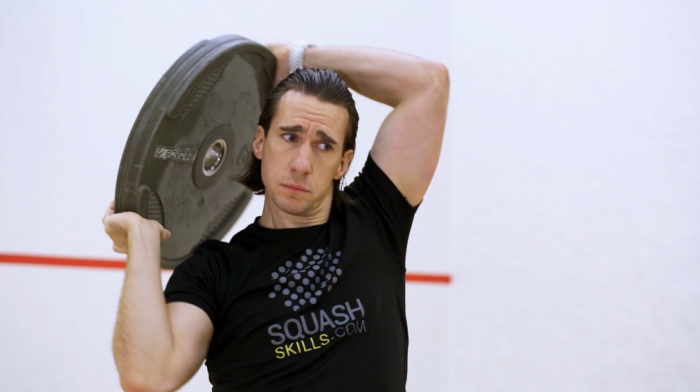When most amateur players talk about ‘getting fitter’ for their squash, what they usually mean is that they want to increase their endurance – their ability to be able to maintain a higher work output for a longer period.
‘Fitness’ in relation to squash can refer to a whole range of different things however, and maximising your all-around physical conditioning requires an awareness of all these different elements – speed, power, mobility etc. Optimal physical performance on court requires more than just adding in some aerobic work in an attempt to boost your stamina – and getting stronger is a key part of this.
So where is the best place to start?
Most good strength & conditioning coaches, as their name suggests, will point you in the direction of a solid strength training programme. Large, multi-joint, compound movements such as squats, lunges, hinges, pushes, pulls, and carries are their usual exercises of choice.
While a fast-paced, high-intensity game might not immediately seem intuitively rooted in strength, being stronger in the body is actually the foundation of all other athletic qualities. If you’re a squash player seriously looking to improve the physical side of your game, then you’re going to need to address your basic strength levels.
 Developing a solid base of strength isn’t just about performance however. Perhaps the primary benefit of making your body stronger is how it, in turn, will make it more robust, and thus more resistant to injury. All the skill, stamina, and speed in the world matter little if you’re always out of action with repetitive injuries.
Developing a solid base of strength isn’t just about performance however. Perhaps the primary benefit of making your body stronger is how it, in turn, will make it more robust, and thus more resistant to injury. All the skill, stamina, and speed in the world matter little if you’re always out of action with repetitive injuries.
Outside the benefits of keeping you in good health and on the court, a solid platform of strength will also give you a number of other more direct advantages – your lunge onto the ball will be more solid and stable (allowing you better control and a wider variety of shot choices), your movement will be enhanced from the increased work output available within your muscles (strength is an essential precursor to power), and your physical presence around the ‘T’ will be more keenly felt by your opponent. Increased strength will even actually help with your endurance, as the energy cost for each movement you make will be reduced due to the enhanced muscle capability, allowing for greater efficiency around the court and a better economy of effort.
Getting in the gym and building strength with resistance training is something many players unfortunately still shy away from, with out-dated ideas of stereotypes of building big, bulky muscles that will slow them down. These bodybuilding themes have little to do with strength training as it relates to the squash player though – high volume, muscle isolating, mass gain targeted training sessions are very different to the more specific, functional, foundational strength desired by the squash player.
For more information on strength for the squash player check out our playlist here. If you are a SquashSkills subscriber then you can also check out our SquashSkills sessions library on the SquashSkills Training app.
Gary Nisbet
B.Sc.(Hons), CSCS, NSCA-CPT, Dip. FTST
SquashSkills Fitness & Performance Director
Sign up to the SquashSkills newsletter
Get world class coaching tips, straight to your inbox!